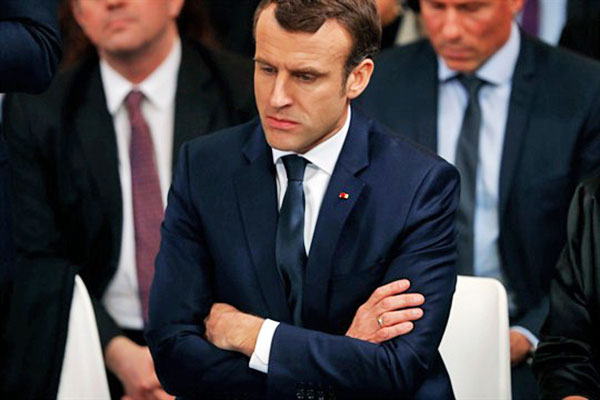|
from
WorldPoliticsReview Website
French President Emmanuel Macron listens to a question during a meeting with mayors and local association members as part of the "national debate," in Evry-Courcouronnes, south of Paris, Feb. 4, 2019 (AP photo by Thibault Camus).
They add to the trouble Macron still faces from the Yellow Vest movement, which though reduced in numbers, has been distilled to a resilient and hardened base of support.
While the movement no
longer poses a direct threat to his political survival, it is now
Macron's reaction to the protests that could undermine his
legitimacy.
Security officials reportedly even saw fit to dust off plans to secure the president, first lady and aides in Elysee Palace's safe room in the event the presidential office and residence were breached.
Over the course of those
first few weeks, Macron himself seemed stunned and unable to
formulate an appropriate response or reaction to the violence on
display at the weekly Saturday mobilizations, directed at him
personally as well as at symbols of the French state, like the Arc
de Triomphe.
These moves, combined with a drop in support for the protests due to their shocking level of violence, provided the space Macron needed to dive into action, albeit action in a postmodern sense:
Calling for a nation-wide grand debate, Macron led things off with a series of marathon dialogue sessions with local mayors, taking hours of pointed questions and responding in thorough detail to policy questions great and small.
In rolled-up shirt-sleeves and without any notes, Macron did what he does best:
At a time when know-nothing-ism has gone global and anti-elitism has become a winning political strategy, it was an impressive demonstration of the value of expertise and policy analysis.
And the results, in terms of Macron's approval ratings, were immediately obvious.
Within a month, he had
regained the support he lost at the
height of the Yellow Vest protests, and his presidency, which at one
point appeared to be in peril, got a second chance at life.
Though down from their peak of several hundred thousand demonstrators nationwide each weekend, the protests still mobilize tens of thousands every Saturday. The demands have always been wildly diverse, but the common thread remains a virulent hatred of Macron and an equally virulent rejection of his legitimacy.
And while the violence
and vandalism that accompanies the marches is the work of a small
minority, it is a persistent and constant feature.
to maintain social order, Macron seems to have chosen an overly repressive stance
that could prove
costly...
But the repetitive nature of the violence now calls into question the state's ability to deliver on one of its fundamental responsibilities, namely to maintain social order and protect its citizenry.
A continued failure to do
so would therefore put the government's legitimacy at risk.
After the first three weekend protests, in which the scale of the violence caught the authorities by surprise, French security forces adopted more assertive and mobile tactics, combined with massive force mobilizations that, with the Yellow Vest movement now waning, mean the riot police often outnumber the protesters nationwide.
In addition to these more
effective measures, though, French security forces have also made
liberal use of stun grenades and rubber-ball launchers that have
caused
gruesome injuries among protesters,
eliciting outrage and
condemnation from rights advocates
in France.
But the arrests led to claims of harassment, and the anti-casseur law included expansive measures, such as allowing government-appointed local prefects to prohibit individuals from protesting and banning face-coverings at demonstrations, that many - including 50 members of Macron's parliamentary majority who abstained from the final vote - argue could be abused to clamp down on political dissent.
The result is that, after
several weeks in which the movement seemed to be in terminal
decline, the Yellow Vests now seem to have achieved a reduced but
steady state.
Alexandre Benalla, Macron's former head of security, was forced to resign last July after footage emerged of him shoving and striking a protester while assisting police in arresting a young couple at a demonstration against Macron's labor reforms.
Benalla had no legal justification for being present at the protest or for assuming a law enforcement role there.
At the time, the fact that the footage had become known to the Elysee Palace in May, when the incident occurred, led to widespread speculation of a cover-up.
The 26-year-old Benalla's
mysterious rise within Macron's inner circle also elicited
curiosity, as did his self-confident standoffs with the Senate
commission that subsequently investigated the matter.
Then last week, the French investigative news site Mediapart published the transcripts of an audio recording it had gotten hold of, in which Benalla discusses a private contract he secured jointly with a colleague to provide security for a Russian oligarch's Paris-based family.
The million-euro contract, as well as a second one for a similar sum that he arranged for another Russian billionaire, apparently overlapped with his time at the Elysee Palace.
The recorded discussion took place in the residence of the French prime minister's head of security, who resigned after the article appeared.
To make matters even
worse, a French investigative judge sought to search the offices of
Mediapart to determine how they had obtained the audio
recording,
setting off a firestorm of criticism
and reviving criticism of both Macron's hostile relationship with
the press and his authoritarian instincts.
Worse still might be the claim that a president who prides himself on having all the answers could have been so clueless about the machinations of such a close aide.
It would be the latest of many paradoxes for Macron, a master communicator prone to tone-deaf public remarks and a brilliant policy analyst with political instincts that border on the suicidal.
|


